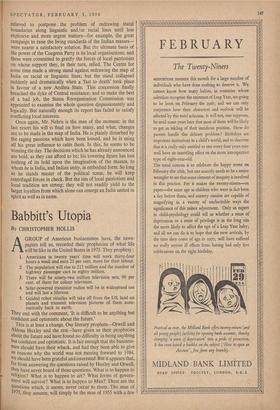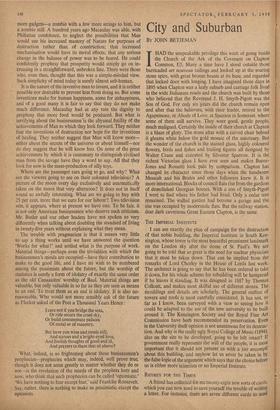Babbitt's Utopia
By CHRISTOPHER HOLLIS AGROUP of American businessmen have, the news- papers tell us, recorded their prophecies of what- life will be like in the United States in 1975. They prophesy ; 1. Americans in twenty years' time will work thirty-four hours a week and earn 25 per cent. more for their labour.
2. The population will rise to 213 million and the number of highway passenger cars to eighty million.
3. There will be ninety-two million television sets, 90 per cent. of them for colour television.
4. Solar-powered transistor radios will be in widespread use and will last a lifetime.
5. Guided robot missiles will take off from the US, land on planets and transmit television pictures of them auto- matically back to earth. They end with the comment, 'It is difficult to be anything but confident and optimistic about the future.'
This is at least a change. Our literary prophets—Orwell and Aldous Huxley and the rest—!have given us their prophecies about the future and have found no difficulty in being anything but confident and optimistic. It is fair enough that the business- men should have their whack, and had they been able to give us reasons why the world was not moving forward to 1984, We should have been grateful and interested. But it appears that, far from answering the questions raised by Huxley and Orwell, they have never heard of these questions. What is to happen to religion? What is to happen to art? What forms of govern- ment will survive? What is to happen to Man? These are the questions which, it seems, never occur to them. The man of 1975, they assume, will simply be the man of 1955 with a few more gadgets—a zombie with a few more strings' to him, but a zombie still. A hundred years ago Macaulay was able, with Philistine confidence, to neglect the possibilities that Man would use his increased mastery of Nature for purposes of destruction rather than of construction; that increased mechanisation would have its moral effects; that any serious change in the balance of power was to be feared. He could confidently prophesy that prosperity would simply go on in- creasing in a straightforward, unbroken line. There were those who, even then, thought that this was a simple-minded view. Such simplicity of mind today is surely almost sub-human.
It is the nature of the inventive man to invent, and it is neither possible nor desirable to prevent him from doing so. But some inventions make for human happiness, some for unhappiness, and of a good many it is fair to say that they do not make much difference. Macaulay had at any rate the dignity to prophesy that more food would be produced. But what is terrifying about the businessmen'is the abysmal futility of the achievements of Man to which they look forward. They neither fear the inventions of destruction nor hope for the inventions of healing. They neither suggest that Man will know more— either about the secrets of the universe or about himself—nor do they suggest that he will know less. On none of the great achievements by which it is customary to distinguish civilised man from the savage have they a word to say. All that they look for now is the mass-production of silly toys.
Where are the passenger cars going to go, and why? What arc the viewers going to see on their coloured televisions? A picture of the moon every day exclusively and automatically taken on the moon that very afternoon? It does not in itself sound so awfully interesting. What are we going to buy with 25 per cent. more that we earn for our labour? Two television sets, it appears, where at present we have one. To be fair, it is not only American businessmen who deserve such criticism. Mr. Butler and our other leaders have, not spoken so very differently when talking about doubling the standard of living in twenty-five years without explaining what they mean.
The trouble with pragmatism is that it means very little to say a thing works until we have answered the question 'Works for what?' and settled what is the purpose of work. Material things—perhaps even the trivialities with which the businessmen's minds are occupied—have their contribution to make to the good life, and I have no wish to be numbered among the pessimists about the future, but the worship of statistics is surely a form of idolatry of exactly the same order as the old Canaanites' worship of Baal. Material ,things are valuable, but only valuable in so far as they are seen as means to an end. To treat them as an end is idolatry. It is also un- reasonable. Who would not more sensibly ask of the future as Flecker asked of the Poet a Thousand Years Hence : I care not if you bridge the seas, Or ride secure the cruel sky, Or build consummate palaces Of metal or of masonry.
But have you wine and music still, And statues and a bright-eyed love, And foolish thoughts of good and ill, And prayers to them that sit above?
What, indeed, is so frightening about these businessmen's prophecies—prophecies which may, indeed, well, prove true, though it does not seem greatly to matter whether they do or not—is the revelation of the minds of the prophets here and now, who think that such prophecies can be called 'optimistic,' 'We have nothing to fear except fear,' said Franklin Roosevelt. Say, rather, there is nothing to make us pessimistic except the optimists.



































 Previous page
Previous page